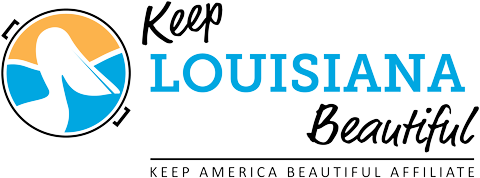Posted on Feb 09, 2023 | Blog,News
Grounds Krewe Leads the Way in Reducing Mardi Gras Waste
In 2022, in New Orleans alone, 1,150 tons of Mardi Gras waste went to the landfill over the course of 11 days. Abandoned beads, cups, and other toxic throws inevitably result in clogged storm drains and flooding, the demise of fish and wildlife, and the pollution of Louisiana’s lakes, rivers, and bayous. Keep Louisiana Beautiful is excited to see groups like Grounds Krewe stepping up and taking action to help reduce the environmental impact of Carnival season.
To provide the community with tools and resources to reduce event waste, Brett Davis, a native New Orleanian and lifelong environmentalist founded Grounds Krewe in 2017, which became a 501(c)3 non-profit organization in 2019. Grounds Krewe’s initiatives include sustainable throw sales, event recycling and waste reduction services, consulting, and equipment rentals.
Learn more about Founding Director Brett Davis and Grounds Krewe in this interview. And remember to follow his lead and reduce, reuse, and recycle this Mardi Gras!
What inspired you to found Grounds Krewe?
I’ve always had a very strong interest in protecting the environment. I grew up hunting and fishing in the woods and coastal marshes of Louisiana and spent time backpacking around the world discovering unique landscape phenomena. When I came back to New Orleans after several years away, I settled into a home design business, which was rewarding in some ways, but not sufficiently answering the call of a myriad of global environmental issues I knew existed. Those issues can be really overwhelming and as one person, it’s hard to feel that you have any ability to make an impact. I started thinking about what environmental problems were unique to my immediate surroundings and where there wasn’t much progress being made. I had experienced Mardi Gras parades as both a spectator and rider since I was a kid and noticed how it had transformed to the point that it was normal to be walking ankle-deep in trash after most parades. I realized most of the waste was recyclable or reusable, no one was claiming responsibility for it, and nothing was being done to mitigate it.
What are some of the repercussions of Mardi Gras waste? How does it impact our environment?
Parades produce as much as 2.6 million pounds of littered street waste in just 11 days of Carnival season. Most of it is unwanted parade throws and items that could be recycled like cans and plastic bottles. The repercussions are many: clogged storm drains, chemicals, paints and micro-plastics leeching into our soil and waterways, trees struggling under the weight of beads, and our children handling throws containing heavy metals and other toxins. Cleaning everything up is also a considerable burden on taxpayers and our city, which “hosts” Carnival. One aspect of the waste that is often overlooked is how parades normalize a culture of littering. There are virtually no bins for trash or recycling available for the public to use, so the people who don’t pack out their refuse just leave it on the street, neutral ground, or on the sidewalk and others follow suit. These are NOT habits we want the public to form!
What popular sustainable throws can we expect to see at the parades this carnival season?
Grounds Krewe has a whole catalog of items that are functional, consumable, biodegradable and/or made from recycled materials. Most of the products come from Louisiana companies and artisans and we engage both volunteers and paid disadvantaged labor forces to help assemble them. This year the non-profit created branded Sustainable Throw Packages for five parade Krewes and sold tens of thousands of items through our online catalog to riders in various parades. Our most popular throws are little 4-ounce bags of red beans, popcorn kernels, coffee, or jambalaya mix that are stickered and stuffed in jute/burlap baggies. We also have purple green and gold Mardi Gras Soap made in Port Allen, Louisiana, Native Flower Starter Kits made with a local gardening club, and Bamboo Handle Toothbrushes with Mardi Gras colored bristles, just to name a few. We have sold over 285,000 throws since the catalog was launched in 2020.
Do you see krewes evolving and adopting more sustainable practices? What has changed since you first started Grounds Krewe?
Carnival throws have become an inherent part of parades. They are the reason for float riders and one of the main attractions for spectators. Their sale also provides a significant source of revenue to the krewes who need to pay for the totally free and unsponsored parades we enjoy. At some point though, a threshold was crossed where the high quantity of cheap throws being sold and tossed started to lower interest and vast quantities were trashed soon after being caught or left ignored on the streets.
The conversation about reducing Mardi Gras waste has totally transformed in recent years. In 2018, the city found and spent millions of dollars cleaning out 93,000 pounds of beads in just five blocks of the storm drain system along the parade route. That really reframed the conversation. This is no longer just about disposable plastic litter, it’s about preserving our flood protection infrastructure and defending the health and safety of parade-goers. Attention to this issue from residents, visitors, and the local and national media has grown exponentially. There is a lot of momentum to do better, to create a Mardi Gras we can all be proud of.
All Grounds Krewe sales and donations are reinvested into waste reduction and parade recycling efforts. What current mission-centric projects are you working on in New Orleans?
In addition to On the Route Parade Recycling and the Sustainable Throw Catalog, Grounds Krewe also started an interactive recycling marching krewe called the “Trashformers.” Twenty-five locals decked out in eco-pun costumes flip the script on parading by collecting waste as they pass by instead of producing it. We ride unique “Re-Cycle” shopping cart + bike hybrids and encourage parade-goers to drink up and hand over their aluminum cans and plastic bottles to marchers such as “Marie Can-toinette” and “Oscar the Recycling Grouch.”
Grounds Krewe also works with events and festivals to implement aluminum can and plastic bottle recycling programs. The non-profit rents out affordable recycling equipment and provides best practice guidance for happenings, both big and small, around the city and region. Our aim is to create a special event culture that retains all of its enjoyment while having the lowest impact possible on our community spaces and our planet’s resources by creating a setting in which environmental stewardship is both convenient and contagious.
How can the individual parade-goer help reduce Mardi Gras waste?
The first and most important step is acknowledging that there is a waste problem and that something should be done about it. Individuals can help by reducing the amount of disposable items they bring to the route and opt for reusable and refillable containers. They can also adopt the “pack in, pack out” mentality of camping and bring their trash and recyclables back home to correctly put into curbside bins. If you are riding in a parade, throwing less is key. Have another sip of your drink and soak in the atmosphere! Don’t just unload your stuff or “throw till it hurts.” And of course, buying more sustainable throws from Grounds Krewe or buying reused throws from groups like ArcGNO, STARC, and St. Michael Special School is better than paying for newly imported ones that only add to the problem.
You are involved with the Recycle Dat initiative this Mardi Gras. Can you tell us about this collaborative effort?
Grounds Krewe has been working on parade recycling initiatives since 2018. Our primary objective was to make it easy for parade-goers to turn in throw donations for ArcGNO and to recycle cans and plastic bottles. Last spring, we were contacted by the Can Manufacturers Institute, a group out of Washington D.C., which represents U.S. metal can makers and their suppliers. They were interested in helping promote used beverage can (UBC) recycling at a few large events around the country, and it just so happens their VP of Sustainability had been in New Orleans during Mardi Gras and saw tens of thousands of cans neglected on the street and noticed a Grounds Krewe recycling station. We put together a program and reached out to the City of New Orleans for permission to place some aluminum can dumpsters close to the route, and they really took hold of the program and brought in several new partners and expanded its reach. During weekend day parades, the public will be able to recycle aluminum cans to benefit local non-profits and donate unwanted throws to ArcGNO at various recycling hubs and stations along the 3-mile route. Additionally, used cans brought to EMR Recycling in Mid City from Feb. 10-25 can be redeemed for cash at the double market rate up to the first $5,000 disbursed thanks to the Can Manufacturers Institute. This is still very much a pilot program. I can’t think of a more difficult setting for recycling than at parades and this is just the next step on a long road.
If a group is interested in reducing waste and improving recycling, how can Grounds Krewe help?
Increasingly, event sponsors, organizers, vendors, and attendees want to be associated with low-waste events. With hundreds of food festivals, concerts, runs, races, expos, block parties, and tailgates each year in New Orleans, the potential for positive environmental impact is high. In January 2020, Grounds Krewe was awarded a grant by the Can’d Aid Foundation to purchase 120 specialized x-frame recycling bins for implementation at events and festivals through an affordable “lend a bin” rental program. The non-profit has worked with events of varying sizes around the city and region, including the 2022 New Orleans Jazz & Heritage Festival.
Visitors to our website will find an “Events & Festivals” page that asks them to consider a few preliminary questions before getting in touch. Once they do, we guide them through the process and the most common obstacles to having an effective program. We know that not every event can have its own hired sustainability coordinator so we want to be a ‘plug and play’ option for those who need help.
How can the public help Grounds Krewe? In what ways can people get involved?
There are several ways to help support our work. As mentioned, just acknowledging and talking truthfully about the issues at hand is helpful. Donating to the non-profit, shopping the Sustainable Throw Catalog, and volunteering with our initiatives are also always welcome.


